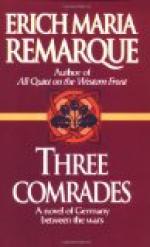Bacha told them about the life at the sheepcotes, and many interesting things from his experiences with the flocks. Then they had supper together, there in the open. Then they sang the evening song, prayed, and Palko read from his Book. At Filina’s request he read the 15th chapter of the Gospel of Luke, about a good shepherd, about a woman who lost her coin, and about a prodigal son who had a good father, but nevertheless ran away from him, and how badly he fared in the world until he returned to his father. During the reading Palko made many beautiful remarks, as he usually did. They all loved to hear him. When he closed, only the fire crackled, and the stars in the heavens were sparkling like a multitude of eyes. The moon lit up the tops of the mountains and woods. Often one of the sheep rang its bell in the fold.
Bacha suddenly lifted up his bowed head, and spoke with a voice such as they had never heard before: “That lost and found sheep am I, my children. The gracious Lord God forgave all my sins. The Lord Jesus sought and found me, and I have surrendered myself to Him altogether, including our huts. Let us pray.”
He took his hat off, folded his hands, and prayed thus, “Our Father,” in such a manner, that nobody had ever heard such a prayer before. Never will Ondrejko de Gemer forget that moment, but I think that none of the others present there will ever be able to forget it either.
When in the huts everything quieted down—not even the dogs barked that night—Bacha, as his custom was, walked all around to see if there was any danger anywhere, before he betook himself to rest. He walked also around the wooden hut and suddenly stopped. There on Ondrejko’s little bench, under the window, wrapped up in a shawl, Madame Slavkovsky sat in the moonlight. Her hands were twined around her knees, and she was thoughtfully looking into the beautiful starry night. He coughed, that she might not be startled. She turned her head, and with a motion indicated her wish that he should take a place beside her. He obeyed.
“You said, Bacha Filina, that that lost and found sheep was you,” she began in her sweet, sad voice. “That woman who lost that coin is also I. More than that even, I am the prodigal daughter.”
“What do you mean by that, lady?” asked Filina seriously.
“When Palko explained how good that father was and how the naughty boy left him, I thought that I did just that to my good dear father; and therefore, from that time on, what sad experiences I have had!” She sighed deeply.
“Tell me all about it. I am an old man and could be your father. I shall understand you.”
“Yes, I will tell you everything, because if you had not saved my poor child he would not have had anybody. Did you not care for him like a father?”




